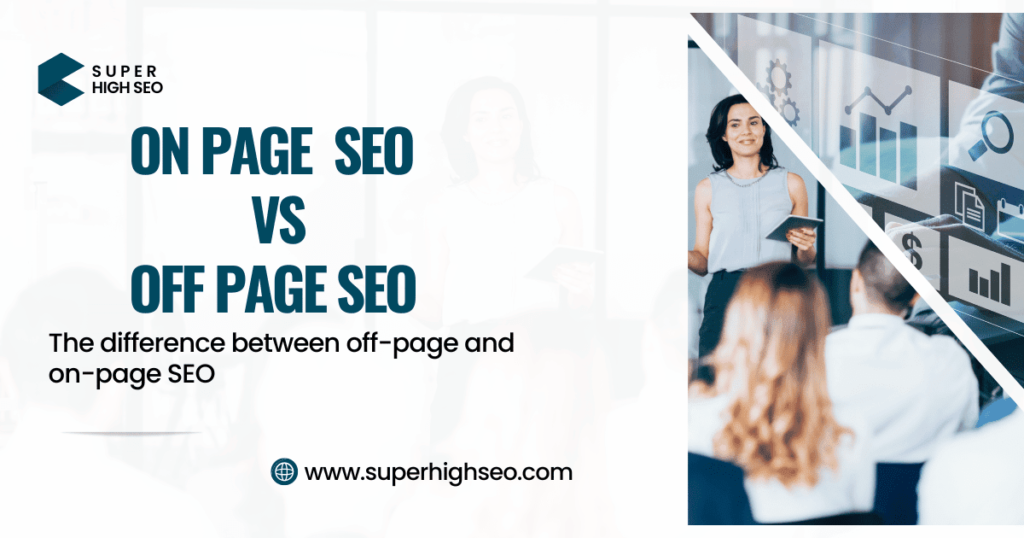
Welcome to the world of SEO – Search Engine Optimization. If you have a website, you have probably heard about the importance of SEO. But do you know the difference between on-page and off-page SEO? In this article, we will guide you through the basics of each type of SEO, their benefits, and how to combine them for maximum results.
On-page and off-page SEO: what’s the difference?
On-page SEO focuses on optimizing the content and structure of your website pages to rank better in search engines. It includes factors such as title tags, meta descriptions, internal links, and keyword placement. Off-page SEO, on the other hand, refers to the actions you take outside of your website to improve its ranking in search engines. This includes building backlinks, social media engagement, and brand mentions.
On-page SEO: the basics you need to know
On-page SEO is essential for your website to rank well in search engines. It includes optimizing your website’s content, images, and structure. Some of the most important factors in on-page SEO are keyword research, title tags, meta descriptions, and internal linking. Make sure your website content is relevant, informative, and engaging for your audience.
Off-page SEO: why it’s important for your website
Off-page SEO is all about building your website’s authority and reputation online. This is done by getting other websites to link to your website, sharing your content on social media, and engaging with your audience through comments and reviews. The more high-quality backlinks your website has, the more likely it is to rank well in search engines.
The benefits of on-page optimization
Optimizing your website’s on-page elements can lead to increased traffic, better user experience, and higher conversion rates. By improving your website’s content and structure, you can also make it easier for search engines to crawl and index your website pages. This, in turn, can lead to better ranking and visibility in search engine results pages (SERPs).
The power of backlinks in off-page SEO
Backlinks are a crucial part of off-page SEO. They are links from other websites that point to your website. The more high-quality backlinks your website has, the more likely it is to rank well in search engines. But, not all backlinks are created equal. It’s important to focus on getting backlinks from relevant and high-authority websites.
Using keywords to boost your on-page ranking
Keywords are the backbone of on-page SEO. They are the words and phrases that people use to search for content online. By optimizing your website’s content with the right keywords, you can improve your chances of ranking well in search engines. But, it’s important to use keywords strategically and avoid keyword stuffing, which can actually harm your website’s ranking.
Social media and the role of off-page SEO
Social media can play a significant role in off-page SEO. Sharing your content on social media platforms can help increase its visibility and reach. It can also help you build relationships with your audience and get more engagement for your brand. When people engage with your content on social media, it sends signals to search engines that your website is trustworthy and authoritative.
The impact of user experience on on-page SEO
User experience (UX) is becoming an increasingly important factor in on-page SEO. This is because search engines want to provide the best possible experience for their users. By optimizing your website’s UX, you can make it easier for people to find what they are looking for and engage with your content. This can lead to better ranking and higher conversion rates.
Measuring the success of your on-page and off-page SEO
Measuring the success of your SEO efforts is crucial to understanding what works and what needs improvement. There are several metrics you can use to track your website’s performance, such as organic traffic, bounce rate, and conversion rate. By analyzing these metrics, you can identify areas of improvement and adjust your SEO strategy accordingly.
Combining on-page and off-page SEO for maximum results
Both on-page and off-page SEO are essential for a successful SEO strategy. By optimizing your website’s content and structure, you can make it easier for search engines to crawl and index your pages. By building backlinks and engaging on social media, you can increase your website’s authority and reputation online. By combining these two types of SEO, you can achieve maximum results and improve your website’s ranking and visibility in search engines.
We hope this article has helped you understand the difference between on-page and off-page SEO and how to use them to optimize your website for better ranking and visibility in search engines. Remember, SEO is an ongoing process, and it requires constant effort and improvement. By following best practices and staying up to date with the latest SEO trends, you can achieve success and grow your online presence.
